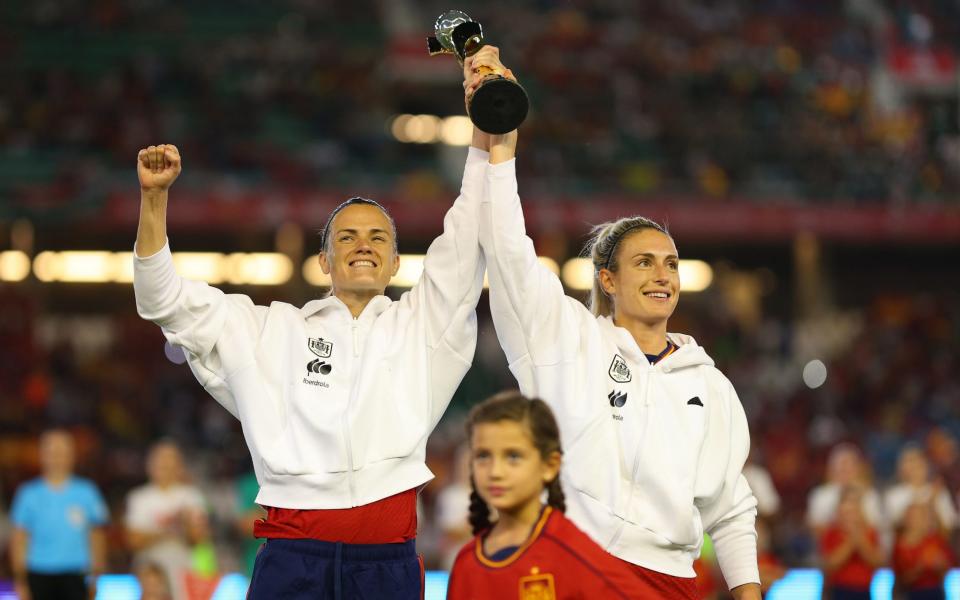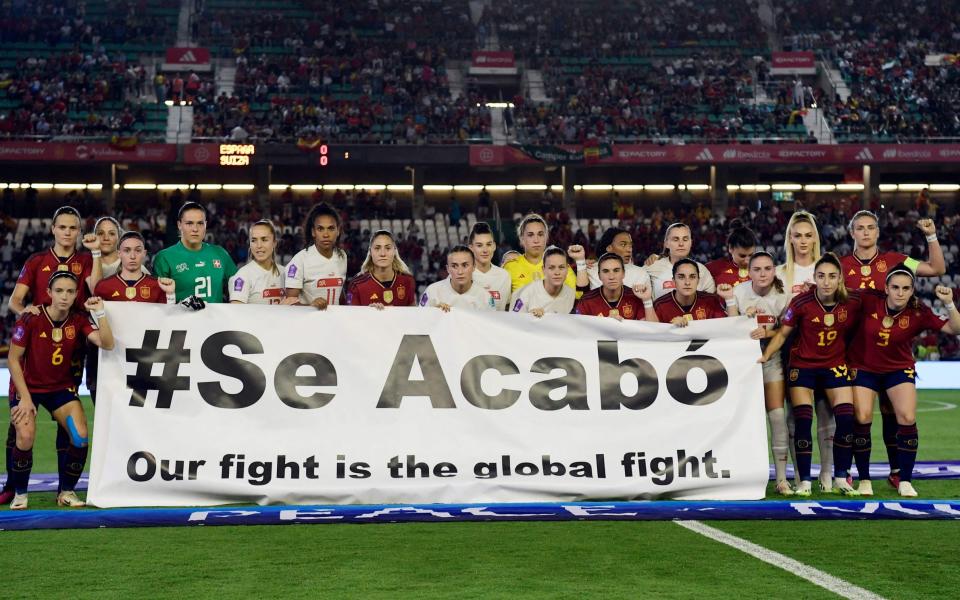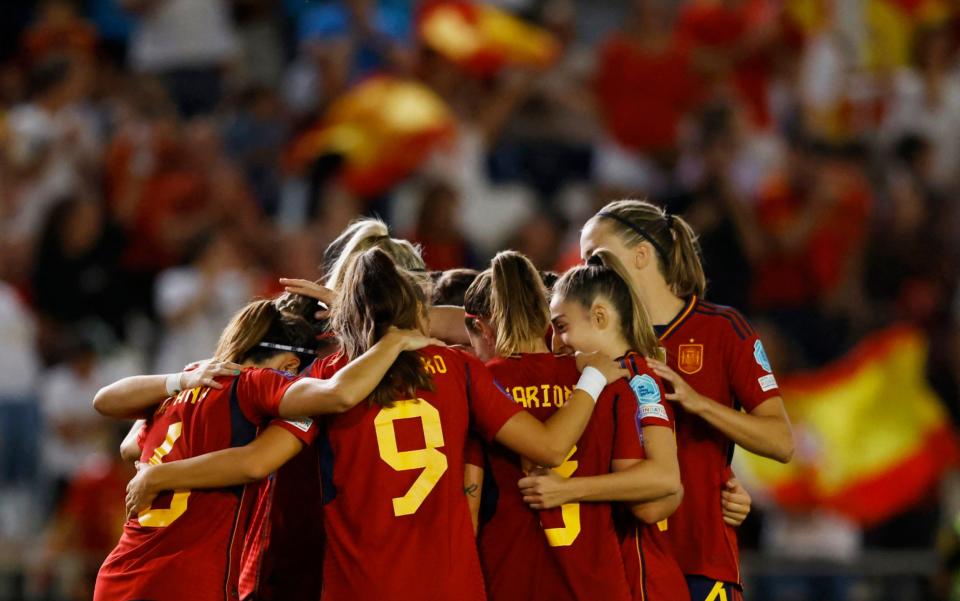
Before a single ball was kicked, the photographers at Nuevo El Arcángel Stadium in Cordoba got their shot. Spain co-captains Irene Paredes and Alexia Putellas held aloft the World Cup for the first time at a home ground, a star above the crest on their chests, and grinned proudly from ear to ear. Those jubilant smiles had been hard to come by since winning the trophy just over a month ago in Sydney, as the pair have instead been busy leading their team’s rebellion against a federation in disarray.
Not two weeks ago, Putellas and Paredes were two of 21 world champions who refused to play this string of Uefa Nations League matches, such was their frustration with the Spanish federation’s (RFEF) handling of the Luis Rubiales scandal and treatment of the team. Now they have two wins from two, the latest a 5-0 thrashing of Switzerland, six points, and feel “hopeful” the federation are prepared to meet the standards they have set off the pitch.
The last 10 days have been turmoil: opting out of selection, controversially being named in head coach Montse Tome’s squad anyway, facing the threat of legal action from the federation if they stayed away, all-night negotiations on the outskirts of Valencia, impromptu press statements every time they left their hotel.
Tuesday night was finally a homecoming fit for the world champions, and what Spanish media described as “the party they deserved”.
A record 14,194 fans filled the Cordoba stadium – which has a capacity of 21,000, but had large banners blocking off seating behind each goal. It marked a record attendance for the women’s national team in a home fixture (the previous record was 11,209 against USA last year) and one imagines they could have filled more seats if given the chance in a larger ground or city.
The party atmosphere had an element of solemnity attached. The fans gave them a standing ovation when the team held up their banner with their now famous rallying cry: “Se Acabo [It’s over]: Our fight is the global fight.” The Switzerland players flanked them, all wearing wristbands emblazoned with the same message.

This Spain team has captured the attention of the world, and the fans they have on home turf came out in force. Hundreds waited outside the team hotel all afternoon in 34-degree heat for a glimpse of their heroines. When the players reached the stadium later, fans greeted the team bus with banners of poignant messages.
“Thank you champions for your fight on and off the pitch #ContigoJenni #SeAcabo,” one woman in her 60s wrote.
Two younger women held up: “Football is a reflection of society. Theirs … ours,” while another read: “They couldn’t only be footballers, and now they are legends.”
On the pitch it was an annihilation. Switzerland never had a hope, as this Spain side looked sharper, and frankly better rested than they had last week in their last-gasp win over Sweden, after all-night negotiations with the federation.
“I remember the first day [of camp], wow, our outlook was very dark,” midfielder Aitana Bonmati, who scored a brace, said post-match. “We weren’t up for training, let alone playing. So to win two games in the way we have. We’ve got lots of talent on the pitch as well as off it. We know what we want. We made our agreements in the meetings, and have gone out and won our matches, as we want to be at the Olympics.
“I hope this situation we’ve had to live through won’t happen again, because this was enough. That feeling that you’ve got to go into the things happening [off the pitch] and not only in football. Now we’re wanting to be professional footballers and nothing else, but for our generation – just like many before – it’s landed with us to fight so that the next generation has better conditions. If that happens then we’ll leave a legacy and be proud of all we worked for, despite not being able to be 100 per cent on the football.”


While it felt like a moment of reflection, the details of their agreement with the federation remain largely unknown and there are plenty of loose ends to tie. Jenni Hermoso, the woman at the centre of this storm, was not called up because of what Tome described as an effort to “protect her”. From what, the players still do not know.
The progress at the core of what many perceive as a rotten federation is only starting to take shape. Local media are reporting that Barcelona’s outgoing general manager of women’s football Markel Zubizarreta is set to become the new sporting director at the Spanish federation.
He would likely be a popular choice among the players, as they have called for a team of professionals with experience befitting the world champions, and Zubizarreta has that in abundance. He built the Barcelona outfit into what it is today, a dominant force in women’s football, attracting record-breaking crowds and winning two of the last three Champions League titles. More so, he and Barcelona’s sports psychologist were present to support them during negotiations in Valencia.
How Tome – former assistant coach to ousted Jorge Vilda – is perceived among the group remains a more complex picture. As the woman that announced them in the squad against their wishes, trust issues could remain. But time is a healer, and goalscorer Olga Carmona told the press on Tuesday night that she thought the team were happy with the backroom staff going forward.
Asked if she was more confident that she will continue in her position after these two wins, Tome said: “I’ve always had confidence, and received that from the players. In football, winning always gives you something different. We are happy, we’ve managed to overcome many things, and now we’re in a moment where we must enjoy this result.”
The mood has definitely lifted. At 90 minutes, with the five-goal evisceration almost sealed, the crowd began chanting “Ole, ole, ole” to their champions. This felt like a victory in every sense, for a team who were owed a real celebration.

